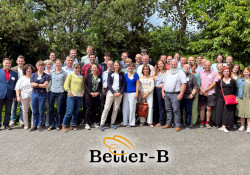FROM NATURE TO PRODUCTS, TOWARDS SUSTAINABILITY.
CIMO/IPB and 17 other European partners team up to restore the harmony and balance of honey bees, through implementation of the Horizon project Better-B

Honey bee colonies are often poorly adapted to cope with external stresses like climate change, pesticide
challenge and parasite attack, exacerbated by modern beekeeping practices. The key to resilient
beekeeping is to harness the power of nature, to restore harmony and balance, both inside the honey bee
colony and between the colony and its environment. The Better-B consortium believes that the path to
harmony and balance is shown by Darwinian colonies: abandoned or feral colonies that have survived in
the wild or been selected on fitness-based criteria. However, such colonies usually lack many favourable
characteristics that are important in modern beekeeping. Our solution is to understand the processes and
mechanisms that are selected in nature and to adapt modern beekeeping practices accordingly, when
appropriate using the benefits of advanced technologies. This is what Better-B stands for. The
implementation of our new approach to apicultural management will be undertaken in close collaboration
with our stakeholder beekeepers. The restoration of harmony and balance must take place on three levels:
the environment, the honey bee and beekeeping practices, all levels of which will be addressed in the
Better-B project.
Our consortium of 18 partners from 14 countries, coordinated by the Ghent University Professor Dirk de Graaf, has been awarded €6.3M by the EU, UK and Switzerland to improve the resilience of beekeeping to abiotic stresses such as climate change, habitat loss and hazardous chemicals. Please follow us on LinkedIn and read all about our project and consortium partners on our website. The Better-B Media Kit contains ready-to-use elements for print and digital use in media coverage of the project.
Our consortium of 18 partners from 14 countries, coordinated by the Ghent University Professor Dirk de Graaf, has been awarded €6.3M by the EU, UK and Switzerland to improve the resilience of beekeeping to abiotic stresses such as climate change, habitat loss and hazardous chemicals. Please follow us on LinkedIn and read all about our project and consortium partners on our website. The Better-B Media Kit contains ready-to-use elements for print and digital use in media coverage of the project.

